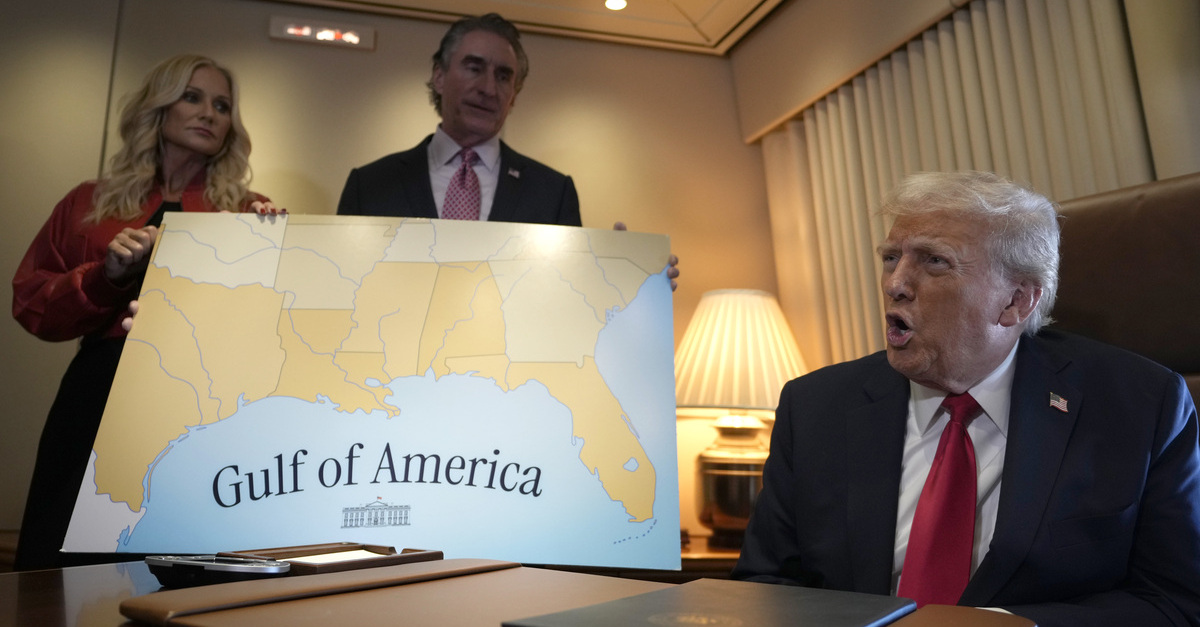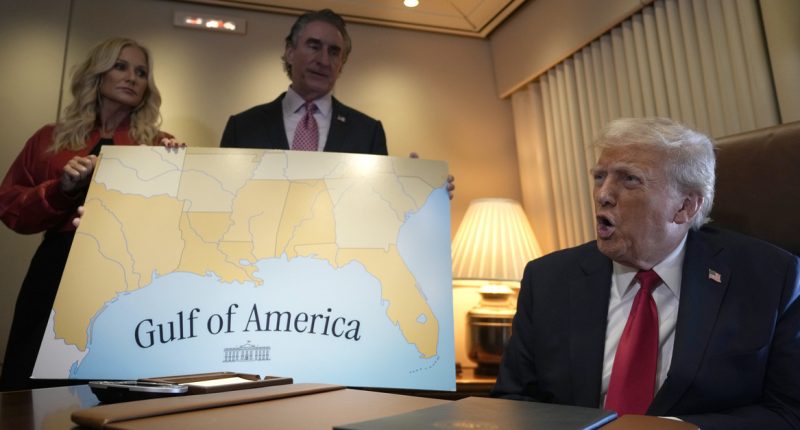
President Donald Trump, from right, speaks to reporters accompanied by Interior Secretary Doug Burgum and Burgum’s wife Kathryn Burgum, aboard Air Force One where Trump signed a proclamation declaring Feb. 9 Gulf of America Day, as he travels from West Palm Beach, Fla. to New Orleans, Sunday, Feb. 9, 2025 (AP Photo/Ben Curtis).
A group of First Amendment experts is imploring a federal court to order The Associated Press back into the select stable of journalists who make up the White House “press pool.”
In a Friday brief, the Knight First Amendment Institute at Columbia University says the government’s behavior necessitates giving AP journalists back their seats in the halls of power.
“Having created the press pool to enable access to the President in limited-space contexts ranging from the Oval Office to foreign travel, the White House has developed a forum — whether a ‘limited public forum’ or a ‘nonpublic forum,’ as the cases use those terms — from which it may not constitutionally exclude a news organization due to its viewpoints,” the amicus, or friend of the court, brief reads. “Yet that is precisely what the White House is doing, by its own admission.”
The press pool is a nearly 144-year-old institution whose members have, for decades, been under the purview of the 111-year-old White House Correspondents Association, a nonprofit famously responsible for its annual, eponymous, comedy-themed dinner. The concept of the pool itself, however, was essentially invented by the AP.
On Feb. 11, White House officials informed the AP its text-based reporters would be barred from entering certain areas as a member of the press pool “unless the AP began referring to the Gulf of Mexico as the Gulf of America, following President Donald Trump’s renaming of that body of water in Executive Order 14172,” which was titled, “Restoring Names That Honor American Greatness.” Later, AP photographers were allegedly banned as well, the organization said.
On Feb. 21, the AP filed a lawsuit in D.C. federal court accusing the White House of engaging in “content- and viewpoint-based discrimination” in violation of the First Amendment. The complaint requested a temporary restraining order and asked the court to reverse the ban. An amended filing added the photographer ban to the complaint and pushed for a preliminary injunction.
So far, U.S. District Judge Trevor McFadden, a Trump appointee, has refused injunctive relief — while at the same time arguing the AP is likely to win on the merits of their case.
“It seems pretty clearly viewpoint discrimination,” McFadden said.
More Law&Crime coverage: ‘Devised a way to skirt this court’s authority’: Trump admin should be held in contempt for violating a ‘whole swatch’ of federal court orders blocking anti-transgender policies, states say
The U.S. Supreme Court’s public forum doctrine centers around the notion that certain places — either physical or digital — have, by tradition or practice, been used for First Amendment purposes and should remain free of government interference. Under high court jurisprudence, there are three types of forums: traditional or quintessential, designated or limited, and closed or nonpublic.
To hear the plaintiffs and the amici tell it, the White House press pool is a limited public forum created by the government.
“The White House’s establishment of the press pool has created a limited public forum, to the benefit of the public as a whole,” the amicus brief argues. “The pool helps provide a prerequisite for a flourishing democracy: access to an unvarnished view of the words and actions of the nation’s chief executive, intermediated by journalists who can report without fear or favor and attempt to hold the President to account through questioning.”
Here, the Knight Center says, history is, in fact, quite instructive.
“The relationship has endured even during the eras of rockiest relations between the White House and the press during the Watergate investigations, and Independent Counsel Kenneth Starr’s investigation of President Bill Clinton,” the brief goes on. “Nor did the White House attempt to interfere with the pool during President Trump’s first term.”
And, the argument goes, viewpoint-based discrimination cannot justify the exclusion of anyone from such a public forum.
Love true crime? Sign up for our newsletter, The Law&Crime Docket, to get the latest real-life crime stories delivered right to your inbox.
The Trump administration, for its part, clearly singled out the AP for their editorial perspective, the lawsuit and amici claim.
From the amicus brief, at length:
The White House’s decision to ban the AP from the press pool based on the AP’s editorial decisions thus impermissibly excludes the AP from a limited public forum based on the viewpoint of the AP’s speech. The White House does not deny that it acted based on viewpoint. President Trump said “[w]e’re going to keep them out until such time that they agree that it’s the Gulf of America,” while saying in the same breath that the AP “has been very, very wrong on the election, on Trump and the treatment of Trump.” Similarly, Defendant Chief of Staff Susie Wiles wrote to the AP that the White House’s “view as to why we arrived in this point” is that “the influence” the AP’s “Stylebook has acquired has been misused, and at times weaponized, to push a divisive and partisan agenda.” And Defendant Deputy Chief of Staff Taylor Budowich said “[t]his isn’t just about the Gulf of America. This is about AP weaponizing language through their stylebook to push a partisan worldview in contrast with the traditional and deeply held beliefs of many Americans and many people around the world.”
In pushing for an injunction, the First Amendment experts make several public policy arguments. These are not strictly constitutional pleas but are often considered by courts when considering the various balancing tests and frameworks used to grant or justify requests for relief.
To that end, the Knight Center all but likens the ban on the AP to how journalists are treated in the Russian Federation’s press pool.
“[I]f a press organization can be kicked out of the press pool because of its viewpoints … the remaining members of the press pool would have a strong incentive to soften their coverage of the White House,” the brief continues. “If the White House can evict one outlet from the press pool due to its due to its coverage, it can dangle a sword over those that remain. This phenomenon is familiar to those who have lived under authoritarian regimes.”







